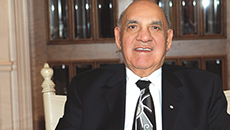Lt. Col. Pritam Jauhal: A Soldier Remembers
MORE Spotlight ARTICLES
Dave Mann: 'Mann'kind Philanthropy

Dave Mann, a lower mainland entrepreneur, has established a non-profit organization called Mannkind Charitable Society (MKCS). This non-profit organization’s mission is to make the world a better place. In order to transform our global societies into liveable spaces for all, MKCS is involved with helping the environment and less fortunate children around the world.
MOTIVATED TO SUCCEED - AFRAJ GILL

In recognition of his scholastic achievements Afraj Gill has won 16 scholarships totaling in at $100,000. This includes a prestigious Simon Fraser University Award, which alone is $34,000. In addition, he was class valedictorian and as the president of the school’s student council and president of the graduation committee, he contributed a lot. “I had responsibilities that not many kids experience.
Asa The Saga - Life of the lumber legend

Asa Singh’s life is a saga with all the ups and downs of an epic. Starting from a wage of 25 cents an hour wages, his net worth is now measured in the billions but he maintains a humble view and emphasizes that his goals are not about being “big”. Asa Singh’s inspiring life journey continues as always to motivate people of all ages and backgrounds. His name and fame travel thousands of miles a day to reach thousands of hearts on the way.
The Future Is Bright For Three Champion Wrestlers

When the word “wrestling” is introduced into a conversation about legitimate athletes and sports, some may imagine the “wrestlers” of the WWE. Certainly some gifted people, put on stage to entertain the masses. Granted they are quite charismatic, talented, and high-flying men; however, they must not to be confused with the determined, physically and mentally strong athletes on the competition mat of freestyle wrestlers.
Darpan Salutes – Anand Kumar, Changing Lives Through Education
Indians are widely acknowledged as bright and adroit individuals, who have over time contributed their knowledge and expertise in the intricate areas of science, mathematics and research and development. This is also one of the reasons that today international organizations are constantly in pursuit of outstanding students from this nation.
Jusleen Virk: Sparring to New Heights

In her white Gi and black belt, Jusleen Virk is proud to be one of the few South Asian girls competing in the sport of karate at an international level.
Her passion for karate started at the young age of 7, when she was living in St. Albert, Alberta. And it’s not a surprise because it runs in her family. Her father, who always stressed the importance of self-defense, began karate at the age of 18. Both her younger sisters, Anisha and Maansi are also competitive in the sport of karate.
